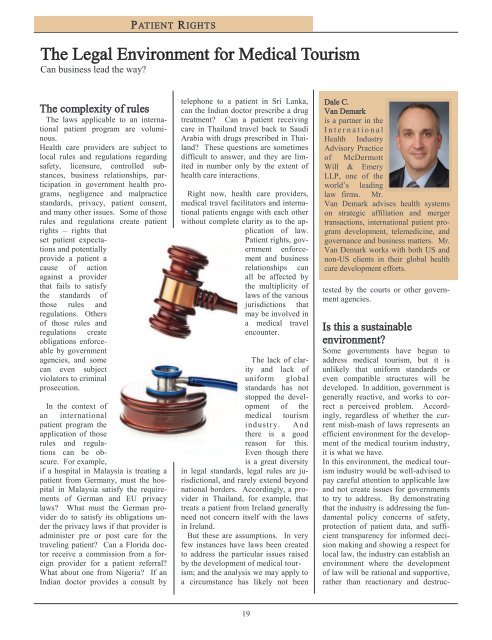Thepatients_prot
Create successful ePaper yourself
Turn your PDF publications into a flip-book with our unique Google optimized e-Paper software.
PATIENT RIGHTS<br />
The Legal Environment for Medical Tourism<br />
Can business lead the way?<br />
The complexity of rules<br />
The laws applicable to an international<br />
patient program are voluminous.<br />
Health care providers are subject to<br />
local rules and regulations regarding<br />
safety, licensure, controlled substances,<br />
business relationships, participation<br />
in government health programs,<br />
negligence and malpractice<br />
standards, privacy, patient consent,<br />
and many other issues. Some of those<br />
rules and regulations create patient<br />
rights – rights that<br />
set patient expectations<br />
and potentially<br />
provide a patient a<br />
cause of action<br />
against a provider<br />
that fails to satisfy<br />
the standards of<br />
those rules and<br />
regulations. Others<br />
of those rules and<br />
regulations create<br />
obligations enforceable<br />
by government<br />
agencies, and some<br />
can even subject<br />
violators to criminal<br />
prosecution.<br />
In the context of<br />
an international<br />
patient program the<br />
application of those<br />
rules and regulations<br />
can be obscure.<br />
For example,<br />
if a hospital in Malaysia is treating a<br />
patient from Germany, must the hospital<br />
in Malaysia satisfy the requirements<br />
of German and EU privacy<br />
laws? What must the German provider<br />
do to satisfy its obligations under<br />
the privacy laws if that provider is<br />
administer pre or post care for the<br />
traveling patient? Can a Florida doctor<br />
receive a commission from a foreign<br />
provider for a patient referral?<br />
What about one from Nigeria? If an<br />
Indian doctor provides a consult by<br />
telephone to a patient in Sri Lanka,<br />
can the Indian doctor prescribe a drug<br />
treatment? Can a patient receiving<br />
care in Thailand travel back to Saudi<br />
Arabia with drugs prescribed in Thailand?<br />
These questions are sometimes<br />
difficult to answer, and they are limited<br />
in number only by the extent of<br />
health care interactions.<br />
Right now, health care providers,<br />
medical travel facilitators and international<br />
patients engage with each other<br />
without complete clarity as to the application<br />
of law.<br />
Patient rights, government<br />
enforcement<br />
and business<br />
relationships can<br />
all be affected by<br />
the multiplicity of<br />
laws of the various<br />
jurisdictions that<br />
may be involved in<br />
a medical travel<br />
encounter.<br />
The lack of clarity<br />
and lack of<br />
uniform global<br />
standards has not<br />
stopped the development<br />
of the<br />
medical tourism<br />
industry. And<br />
there is a good<br />
reason for this.<br />
Even though there<br />
is a great diversity<br />
in legal standards, legal rules are jurisdictional,<br />
and rarely extend beyond<br />
national borders. Accordingly, a provider<br />
in Thailand, for example, that<br />
treats a patient from Ireland generally<br />
need not concern itself with the laws<br />
in Ireland.<br />
But these are assumptions. In very<br />
few instances have laws been created<br />
to address the particular issues raised<br />
by the development of medical tourism;<br />
and the analysis we may apply to<br />
a circumstance has likely not been<br />
Dale C.<br />
Van Demark<br />
is a partner in the<br />
I n t e r n a t i o n a l<br />
Health Industry<br />
Advisory Practice<br />
of McDermott<br />
Will & Emery<br />
LLP, one of the<br />
world’s leading<br />
law firms. Mr.<br />
Van Demark advises health systems<br />
on strategic affiliation and merger<br />
transactions, international patient program<br />
development, telemedicine, and<br />
governance and business matters. Mr.<br />
Van Demark works with both US and<br />
non-US clients in their global health<br />
care development efforts.<br />
tested by the courts or other government<br />
agencies.<br />
Is this a sustainable<br />
environment?<br />
Some governments have begun to<br />
address medical tourism, but it is<br />
unlikely that uniform standards or<br />
even compatible structures will be<br />
developed. In addition, government is<br />
generally reactive, and works to correct<br />
a perceived problem. Accordingly,<br />
regardless of whether the current<br />
mish-mash of laws represents an<br />
efficient environment for the development<br />
of the medical tourism industry,<br />
it is what we have.<br />
In this environment, the medical tourism<br />
industry would be well-advised to<br />
pay careful attention to applicable law<br />
and not create issues for governments<br />
to try to address. By demonstrating<br />
that the industry is addressing the fundamental<br />
policy concerns of safety,<br />
<strong>prot</strong>ection of patient data, and sufficient<br />
transparency for informed decision<br />
making and showing a respect for<br />
local law, the industry can establish an<br />
environment where the development<br />
of law will be rational and supportive,<br />
rather than reactionary and destruc-<br />
19


